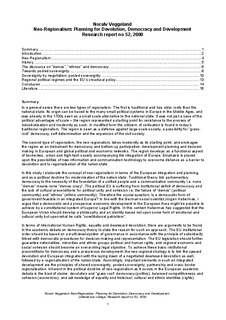Neo-Regionalism: Planning for Devolution, Democracy and Development
Research report
Permanent lenke
http://hdl.handle.net/11250/144939Utgivelsesdato
2000Metadata
Vis full innførselSamlinger
Sammendrag
In a general sense there are two types of regionalism. The first is traditional and has older roots than the
national state. Its origin can be traced to the many small political systems in Europe in the Middle Ages, and
was already in the 1700s seen as a small scale alternative to the national state. It was not just a case of the
political advantages of scale – the region represented a starting point for resistance to the process of
industrialisation and modernity as such. In modified form the criticism of civilisation is found in today´s
traditional regionalism. The region is seen as a defence against large-scale society, a possibility for “grassroot”
democracy, self-determination and the expansion of the civil society.
The second type of regionalism, the neo-regionalism, takes modernity as its starting point, and envisages
the region as an instrument for democracy and bottom-up participation, development planning and decisionmaking
in European and global political and economic networks. The region develops as a functional aspect
of borderless, urban and high-tech society accompanying the integration of Europe. Emphasis is placed
upon the possibilities of new information and communication technology to overcome distance as a barrier to
devolution and to regionalisation of the nation-state.
In this study I elaborate the concept of neo-regionalism in terms of the European integration and planning,
and as a political doctrine for modernisation of the nation-state. Traditional theory link parliamentary
democracy to the necessity of the foundation of a unified people and a communicative community i.e. none
“demos” means none “demos-cracy”. The political EU is suffering from institutional deficit of democracy and
the lack of cultural preconditions for political unity and cohesion i.e. the failure of “demos” (political
community) and “ethnos” (ethnic community). Therefore the crucial question: Is a democratic form of
government feasible in an integrated Europe? In line with the German social scientist Jürgen Habermas, I
argue that a democratic and a prosperous economic development in the European Area might be possible to
achieve by a constitutional system of superior Legal Rights. In this context Habermas has suggested that the
European Union should develop a philosophy and an identity based not upon some form of emotional and
cultural unity but upon what he calls “constitutional patriotism”.
In terms of international Human Rights, equality and downward devolution, there are arguments to be found
in the academic debate on democracy theory to state the reason for such an approach. The EU institutional
order should be based on a multi-level-system of governance in accordance with the principle of subsidiarity
linked with democratic procedures for decision-making and representation. The EU legislation should further
guarantee nationalities, minorities and ethnic groups political and human rights, and regional economic and
social cohesion should become an overarching legal objective. To achieve these basic institutional
preconditions for democracy and a prosperous development, the neo-regional strategy is to link the upward
devolution and European integration with the laying down of a negotiated downward devolution as well,
followed by a regionalisation of the nation-state. Accordingly, important elements in such an integrated
development are the principles of shared sovereignty, pooled sovereignty, partnership and cross-border
regionalisation. Inherent in the political doctrine of neo-regionalism as it occurs in the European academic
debate is the triad of claims: devolution and “grass root” democracy (politics), balanced competitiveness and
cohesion (economics), and acknowledge of equality and historical, cultural and ethnic identities (rights).
